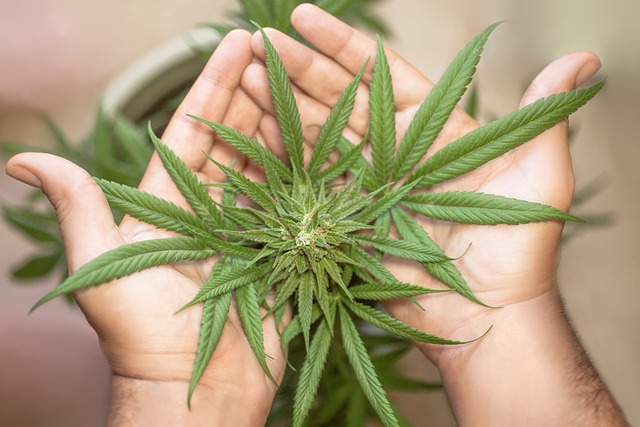THCA-rich cannabis topicals have gained traction in retail markets as non-psychoactive alternatives for pain and inflammation relief due to their interaction with the endocannabinoid system. These products are enriched with THCA, a compound found in cannabis that provides therapeutic benefits without the mind-altering effects of THC. The market for these topicals is expanding, supported by their presence in dispensaries and online stores nationwide. Users can benefit from targeted relief for conditions like chronic pain, inflammation, and skin issues, with reports of improved skin health and overall wellbeing. While the therapeutic potential of THCA is promising, consumers should approach product selection with caution, considering factors like purity, potency, and individual sensitivities. It's important to be aware of side effects and potential allergic reactions when using these topicals, especially for those sensitive to cannabinoids. As interest in THCA-rich cannabis topicals continues to rise, it's crucial to weigh the benefits against the risks and consult healthcare professionals when necessary. These topicals are becoming a significant part of wellness regimens, with thca rich cannabis topicals sale becoming more commonplace.
Exploring the nuanced effects of THCA-rich cannabis topicals has become increasingly relevant in the wellness market, as consumers seek out effective, non-psychoactive treatments for various ailments. This article delves into the burgeoning world of THCA-rich cannabis topicals sale, offering insights into their potency, therapeutic benefits, and side effects. We’ll navigate through the intricate chemistry of THCA, its role in skin health, and how it differs from other cannabinoids, providing a comprehensive overview of its effects when applied topically. Additionally, we’ll explore the legal considerations surrounding their sale, the entourage effect in topical formulations, and the importance of proper dosing to maximize benefits while minimizing potential adverse reactions. Join us as we examine the latest research, consumer feedback, and best practices for incorporating these products into your wellness regimen.
- Unveiling the Potency of THCA-Rich Cannabis Topicals in Sale Markets
- THCA Flower: A Comprehensive Overview of Its Side Effects and Benefits
- The Therapeutic Properties of THCA and Its Role in Topical Applications
Unveiling the Potency of THCA-Rich Cannabis Topicals in Sale Markets

In recent times, the emergence of THCA-rich cannabis topicals in retail markets has garnered significant attention from consumers and healthcare professionals alike. These topical applications, rich in Tetrahydrocannabinolic Acid (THCA), offer a unique approach to harnessing the therapeutic benefits of cannabis without the psychoactive effects typically associated with THC. The potency of THCA-rich cannabis topicals lies in their ability to interact with the body’s endocannabinoid system, providing relief from various conditions such as chronic pain, inflammation, and skin ailments. Unlike smoked or ingested cannabis products, topicals offer targeted relief at the site of application, making them an increasingly popular choice for those seeking localized effects without psychoactive impact. The sale markets for these products have expanded rapidly, driven by consumer demand for effective, non-psychoactive alternatives to traditional medications and treatments.
As these THCA-rich cannabis topicals continue to flood the market, their efficacy and safety profiles are under scrutiny. Evidence suggests that THCA may possess anti-inflammatory and neuroprotective properties, contributing to its therapeutic potential. However, the variations in product formulations, concentrations of THCA, and individual reactions necessitate careful consideration when selecting a topical. Consumers are advised to approach these products with informed decision-making, considering factors such as purity, potency, and the presence of any additional compounds that may enhance or alter their effects. The growing body of research and anecdotal evidence support the use of THCA-rich cannabis topicals for a variety of skin and musculoskeletal conditions, making them a significant addition to the wellness arsenal in sale markets across the country.
THCA Flower: A Comprehensive Overview of Its Side Effects and Benefits

THCA, or Tetrahydrocannabinolic Acid, is a natural compound found in the cannabis plant that has garnered attention for its potential therapeutic properties and as a precursor to THC, the psychoactive component of cannabis. As interest in cannabinoid-based treatments grows, THCA-rich cannabis topicals have become increasingly available for sale, offering a non-psychoactive alternative for those seeking relief from various conditions. While these topical applications are praised for their potential benefits, including pain reduction and anti-inflammatory effects, it is crucial to understand the side effects associated with THCA flower usage.
Common side effects may include mild psychoactive effects if the THCA is converted to THC through heating or decarboxylation, dry mouth and eyes, dizziness, or anxiety in individuals sensitive to cannabinoids. Additionally, topical application can lead to skin irritation or allergic reactions in some users. The benefits of THCA-rich cannabis topicals, such as improved skin health due to its potential anti-bacterial and anti-acne properties, must be weighed against these side effects. Users should start with a low concentration and conduct a patch test to gauge their sensitivity before regular use. It is also advisable to consult with a healthcare professional before incorporating THCA flower topicals into one’s health regimen, especially if pregnant, breastfeeding, taking other medications, or have pre-existing medical conditions. Understanding both the benefits and potential side effects of THCA-rich cannabis topicals is key to making informed decisions about their use.
The Therapeutic Properties of THCA and Its Role in Topical Applications

THCA, or tetrahydrocannabinolic acid, is a non-psychoactive compound found in cannabis that has garnered attention for its therapeutic potential. As the precursor to THC, it shares many of the same properties but lacks psychoactive effects when consumed in its raw form. Topical applications enriched with THCA are gaining popularity due to their ability to provide localized relief without the high associated with THC. These THCA-rich cannabis topicals are designed to harness the anti-inflammatory and pain-relieving properties of THCA, making them a valuable option for those seeking targeted relief from muscle aches, joint discomfort, or skin conditions. The unique interaction of THCA with the body’s endocannabinoid system can modulate pain signals and reduce inflammation, offering a safe and effective alternative to traditional treatments. Furthermore, these topicals are becoming increasingly accessible, with many vendors offering THCA rich cannabis topicals for sale both in dispensaries and online platforms, catering to a growing demand for cannabinoid-based wellness solutions. Users report benefits such as soothed skin, alleviated discomfort, and improved overall wellbeing, making THCA a promising therapeutic tool within the realm of topical cannabinoid applications.
In conclusion, the exploration of THCA-rich cannabis topicals in retail markets has revealed their potent therapeutic properties, offering a promising alternative for those seeking relief. The comprehensive analysis of THCA flower’s side effects and benefits has highlighted its potential, particularly when applied topically. It is clear that consumers are increasingly interested in THCA rich cannabis topicals sale due to their targeted effects and minimal psychoactive impact. As the body of research continues to grow, so too does our understanding of how THCA interacts with the skin, providing relief from various ailments without the need for ingestion. With this knowledge, consumers can make informed decisions about incorporating these products into their wellness routines, confident in their efficacy and safety.
